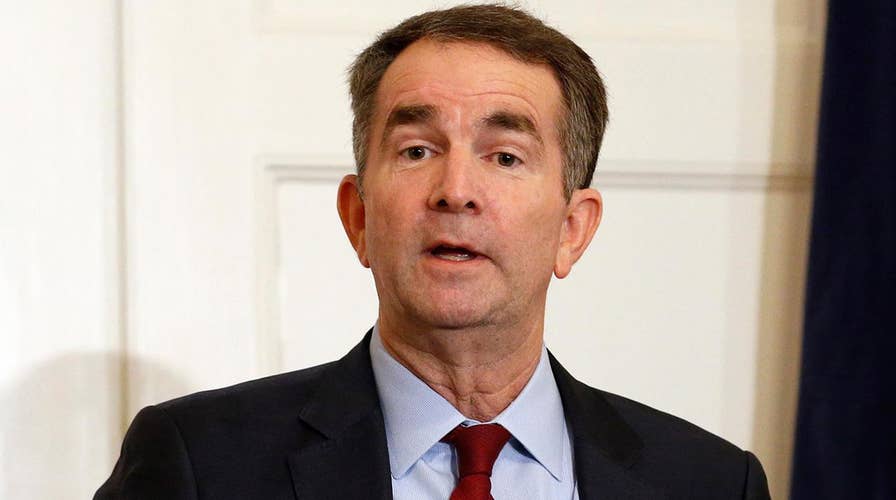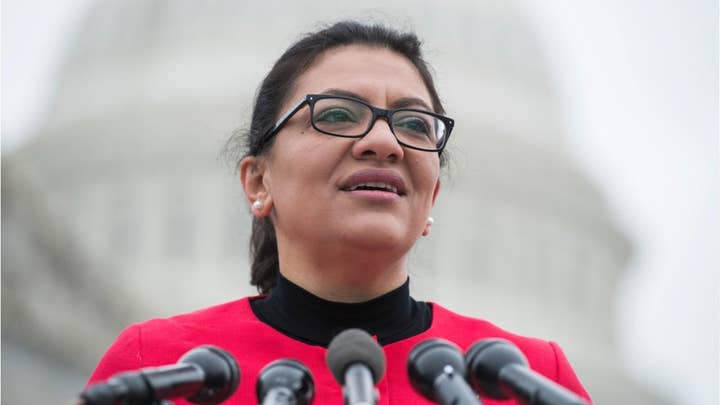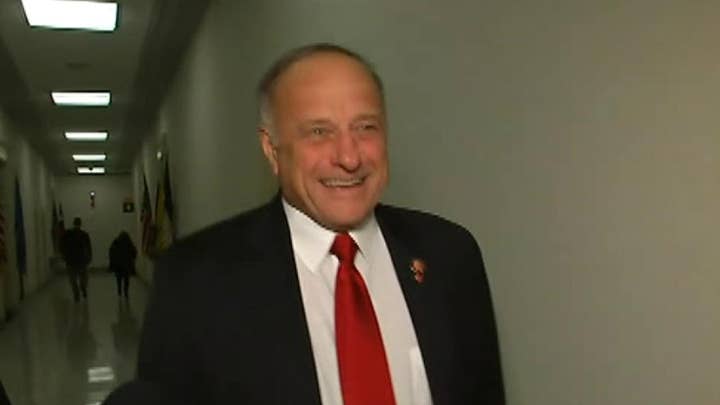Does Gov. Northam’s racist photo scandal have national implications for the Democratic Party?
Former White House deputy chief of staff Karl Rove says Democratic Virginia Gov. Ralph Northam’s controversial yearbook photo scandal will most likely die down by the 2020 election cycle.
Race, ethnicity and religion wove the fabric of the American narrative.
The issue of slavery dominated debates prior to the republic’s inception, continuing through the Civil War. There were questions about how to deal with African Americans, Native Americans and other minorities. There were internment camps for Japanese Americans during World War II. The civil rights movement rattled the nation in the 1950s and 1960s.
FAIRFAX RETAINS LAWYERS USED BY KAVANAUGH
So it’s no surprise that we’re talking about race when it comes to Democratic Virginia Gov. Ralph Northam, the comments of Rep. Steve King, R-Iowa, the House voting to disapprove of King’s remarks, President Trump, unrest in Charlottesville, Va., or Covington Catholic High School students standing on the steps of the Lincoln Memorial amid Native Americans.
We talked about race, ethnicity and religion with the election of Reps. Rashida Tlaib, D-Mich., and Ilhan Omar, D-Minn., the first Muslim female members of Congress. Tlaib is the first Palestinian American to serve in Congress. Omar is the first Somali American.
The conversation continued when Reps. Ted Deutch, D-Fla., and Eliot Engel, D-N.Y. -- both Jewish -- raised concerns about what some interpreted as anti-Semitic views expressed by Tlaib and Omar.
Many of the looms which weave the fabric on race can be found right inside the U.S. Capitol.
There’s a reason former Senate Majority Leader Trent Lott, R-Miss., is former Senate majority leader. Key figures in the administration of President George H.W. Bush wanted Lott out of the position. However, it wasn’t until Lott showed up at the 100th birthday party of the late Sen. Strom Thurmond, R-S.C., in December 2002 that Lott’s opponents saw an opening. Thurmond ran for president in 1948 on “state’s rights” and opposed civil-rights legislation.
“When Strom Thurmond ran for president, we voted for him. We’re proud of it. And if the rest of the country had followed our lead, we wouldn’t have had all of these problems over the years, either,” said Lott.
Lott was done as majority leader in 15 days.
That said, there is still a room in the Capitol named after Thurmond. Senate Republicans meet there on a regular basis. They even used the Thurmond room to deliver official responses to State of the Union addresses and other major speeches.
For the record, the Capitol also houses the Robert C. Byrd suite, named after late Senate Majority Leader Robert Byrd, D-W.Va. All Senate Democratic leaders, be they in the majority or minority, have occupied those rooms since the late 1980s.
In the 1940s, Byrd enlisted more than 100 friends to start a new Ku Klux Klan chapter in his hometown in southern West Virginia. Byrd rose to the level of “Exalted Cyclops” in the Klan and said he didn’t want the U.S. “degraded by race mongrels.” Byrd later disavowed the KKK, calling it “the greatest mistake I ever made.” He eventually argued that “intolerance had no place in America,” adding, “I don’t mind apologizing over and over again. I can’t erase what happened.”
The race debate always simmers on Capitol Hill.
You will find the statue of Confederate Gen. Robert E. Lee in the U.S. Capitol crypt. It’s one of two statues from Virginia. The statue of Confederate President Jefferson Davis occupies a space in Statuary Hall. A few steps away from Davis is the statue of Confederate Vice President Alexander Hamilton Stephens of Georgia. Across the chamber is Alabama’s statue of Gen. Joseph Wheeler. Wheeler fought for both the North and South, but the likeness depicts Wheeler in Confederate garb, complete with “CSA” emblazoned on his belt buckle, for “Confederate States of America.”
We haven’t even discussed the Nevada statue of the late Democratic Sen. Pat McCarran. Fly into Las Vegas, and you’ll land at McCarran International Airport. McCarran is credited with developing the modern U.S. Air Force and was an important figure in aviation policy. But, McCarran also feared the U.S. would be “contaminated” by “aliens.”
In the summer of 2015, the House struggled to approve a measure to fund the Department of the Interior. The House initially adopted an amendment by Rep. Jared Huffman, D-Calif., to bar the flying of the Confederate flag at federal cemeteries. The House then pushed to strip the Huffman amendment from the bill. That move jeopardized overall passage of the measure.
NEW GOVERNOR OF VIRGINIA COULD BE DECIDED BY WAY OF CERAMIC BOWL
Democrats then introduced a resolution demanding that the House “remove any State flag containing any portion of the Confederate battle flag” from the House side of the Capitol. The Mississippi flag includes a portion of the Confederate battle flag in the upper left-hand corner.
For years, the flag of every state hung in the underground tunnel linking the Capitol and the Rayburn House Office Building, but no longer. After the Confederate flag dustup, the House revamped the tunnel with new lighting and infrastructure improvements. The flags were removed – only to be replaced with gigantic replicas of each state’s quarters. The reason? Republicans -- then in control of the House -- fretted about the Confederate flag resolution. So to circumvent a complication on the floor, the House simply ditched the state flags, filling the corridor with the state quarters.
Democrats have long enjoyed a better standing at the polls when it comes to minorities and most ethnic groups, so it’s seen as easy politics for Democrats to go to the mat when Trump or Steve King says things that are controversial. It’s another when there are issues with Ralph Northam.
By the same token, Republicans see the potential electoral-demographic issue that awaits them at the ballot box in the coming years. Many Republicans agree they must make inroads with minority voters.
House Minority Leader Kevin McCarthy came out swinging last month about King. The California Republican swiftly stripped the Iowa congressman of his committee assignments. Democrats endeavor to contrast themselves with Trump and King and some of the things they’ve said about race, but storm clouds engulfing Northam hamstring Democrats when they attempt to portray themselves as progressive on race issues and more aligned with minority voters.
CLICK HERE TO GET THE FOX NEWS APP
Both parties often revel in schadenfreude when a figure of the opposite party commits a major gaffe or utters something flat-out offensive on race, but neither side is truly absolved from these transgressions.
After all, the race/ethnicity/religion conversation is woven into the fabric of the nation. It’s been there since before the beginning. So it should surprise no one when these tempests arise today.















































